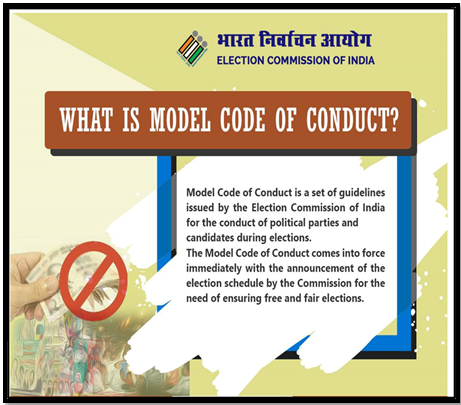WHAT EC MUST GUARANTEE
SYLLABUS:
GS 2:
- Statutory, Regulatory and various Quasi-judicial Bodies.
- Powers, Functions, and Responsibilities of Constitutional Bodies.
Focus:
- The CEC and Other Election Commissioners Act, 2023, which gave the central government a majority vote in the appointments of the Chief Election Commissioner (CEC) and other election commissioners.
Source: couseguide
The ECI, an independent constitutional authority, ensures the integrity of elections in India, overseeing voter registration through to result declaration. It has introduced technologies like electronic voting machines to enhance the security and accessibility of the voting process.
History and Evolution of the ECI:
- Established on January 25, 1950, under the Constitution of India to conduct free and fair elections.
- First led by Chief Election Commissioner Sukumar Sen who established foundational practices.
- Transitioned from traditional ballot boxes to electronic voting machines between 1998 and 2001.
- Developed and tested electronic voting technologies with state-owned corporations.
- Has evolved to meet the demands of a growing and diversifying electorate.
Roles and Responsibilities:
- Conducts elections to the Parliament, State Legislatures, and for the President and Vice-President of India.
- Manages the delimitation of electoral constituencies and the preparation of electoral rolls.
- Recognizes political parties and monitors their adherence to the Model Code of Conduct.
- Regulates election expenses and ensures that campaigns are conducted fairly.
- Investigates violations and complaints related to election procedures and conduct.
Ensuring Free and Fair Elections:
- Prioritizes the creation of a comprehensive and accurate voter registration system.
- Engages in nationwide campaigns to educate and inform voters about their rights and responsibilities.
- Implements strict measures to maintain order and fairness at polling stations.
- Removes duplicate, deceased, or fraudulent names from voter lists to maintain electoral roll integrity.
- Uses technology and human resources to monitor election activities and prevent malpractices.
Independence of Crucial Institutions
- Ensures that decisions and policies are made in the best interest of citizens without political interference.
- Maintains the integrity of democratic processes by safeguarding free and fair elections.
- Prevents abuse of power by holding those in authority accountable.
- Upholds the rule of law by ensuring impartiality and fairness in enforcement.
- Preserves public trust in governmental and constitutional bodies.
Safeguard Constitutional Framework:
- Prevents erosion of fundamental democratic principles.
- Ensures that changes to laws and policies are made transparently and with due process.
- Protects the federal structure of governance by upholding the autonomy of state institutions.
- Resists attempts to centralize power by ensuring a balance of authority.
- Promotes adherence to constitutional values such as secularism, equality, and justice.
Constitutional Provisions for Elections:
|
Electoral Reforms and Initiatives:
- Introduced electronic voting machines to reduce counting errors and speed up the result declaration process.
- Implemented the Voter Verifiable Paper Audit Trail system for enhanced transparency and voter confidence.
- Launched online platforms like the National Voters’ Service Portal to simplify voter registration and information access.
- Developed mobile applications to provide easy access to electoral services and support.
- Focuses on inclusivity, ensuring that marginalized and differently-abled voters can participate effectively in the electoral process.
Challenges Confronted by the ECI:
- Deals with the pervasive influence of money and criminal elements in the electoral process.
- Faces challenges in curbing illegal campaign financing and ensuring a level playing field for all candidates.
- Struggles with voter apathy, particularly among the youth and urban populations.
- Works to manage the logistical complexities of conducting elections across diverse and populous regions.
- Continuously updates legal and regulatory frameworks to keep up with evolving political and technological landscapes.
Impact on Indian Democracy:
- Has reinforced democratic institutions by ensuring that elections reflect the genuine will of the people.
- Improved the accessibility, efficiency, and security of the voting process through technological innovations.
- Fostered a competitive political environment by maintaining fairness and transparency in electoral processes.
- Increased voter awareness and participation through targeted outreach and educational initiatives.
- Played a crucial role in shaping the political discourse and decision-making in India.
Upholding Model Code of Conduct:
- Enforces strict adherence to the MCC by all political entities.
- Takes prompt action against violations to maintain electoral integrity.
- Issues clear guidelines and penalties for non-compliance.
- Ensures that election campaigns are conducted in a fair and respectful manner.
- Monitors and addresses hate speech and divisive rhetoric during elections.
Structure of the Election Commission of India (ECI):
Appointment and Tenure of Commissioners:
Removal of Commissioners:
|
Source:The Hindu
Mains Practice Question:
The independence and integrity of crucial institutions are necessary to safeguard citizens’ interests. In light of recent developments, critically analyze the role of the Election Commission of India (ECI) in ensuring free and fair elections.
Associated Articles:




